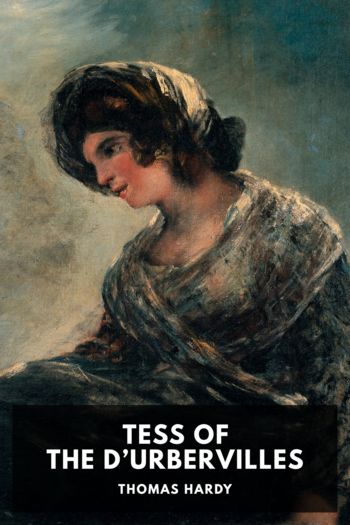Tess of the d’Urbervilles - Thomas Hardy (best color ereader .txt) 📗

- Author: Thomas Hardy
Book online «Tess of the d’Urbervilles - Thomas Hardy (best color ereader .txt) 📗». Author Thomas Hardy
It was the third day of the estrangement. Some might risk the odd paradox that with more animalism he would have been the nobler man. We do not say it. Yet Clare’s love was doubtless ethereal to a fault, imaginative to impracticability. With these natures, corporal presence is something less appealing than corporal absence; the latter creating an ideal presence that conveniently drops the defects of the real. She found that her personality did not plead her cause so forcibly as she had anticipated. The figurative phrase was true: she was another woman than the one who had excited his desire.
“I have thought over what you say,” she remarked to him, moving her forefinger over the tablecloth, her other hand, which bore the ring that mocked them both, supporting her forehead. “It is quite true, all of it; it must be. You must go away from me.”
“But what can you do?”
“I can go home.”
Clare had not thought of that.
“Are you sure?” he inquired.
“Quite sure. We ought to part, and we may as well get it past and done. You once said that I was apt to win men against their better judgement; and if I am constantly before your eyes I may cause you to change your plans in opposition to your reason and wish; and afterwards your repentance and my sorrow will be terrible.”
“And you would like to go home?” he asked.
“I want to leave you, and go home.”
“Then it shall be so.”
Though she did not look up at him, she started. There was a difference between the proposition and the covenant, which she had felt only too quickly.
“I feared it would come to this,” she murmured, her countenance meekly fixed. “I don’t complain, Angel, I—I think it best. What you said has quite convinced me. Yes, though nobody else should reproach me if we should stay together, yet somewhen, years hence, you might get angry with me for any ordinary matter, and knowing what you do of my bygones, you yourself might be tempted to say words, and they might be overheard, perhaps by my own children. O, what only hurts me now would torture and kill me then! I will go—tomorrow.”
“And I shall not stay here. Though I didn’t like to initiate it, I have seen that it was advisable we should part—at least for a while, till I can better see the shape that things have taken, and can write to you.”
Tess stole a glance at her husband. He was pale, even tremulous; but, as before, she was appalled by the determination revealed in the depths of this gentle being she had married—the will to subdue the grosser to the subtler emotion, the substance to the conception, the flesh to the spirit. Propensities, tendencies, habits, were as dead leaves upon the tyrannous wind of his imaginative ascendency.
He may have observed her look, for he explained—
“I think of people more kindly when I am away from them”; adding cynically, “God knows; perhaps we will shake down together some day, for weariness; thousands have done it!”
That day he began to pack up, and she went upstairs and began to pack also. Both knew that it was in their two minds that they might part the next morning forever, despite the gloss of assuaging conjectures thrown over their proceeding because they were of the sort to whom any parting which has an air of finality is a torture. He knew, and she knew, that, though the fascination which each had exercised over the other—on her part independently of accomplishments—would probably in the first days of their separation be even more potent than ever, time must attenuate that effect; the practical arguments against accepting her as a housemate might pronounce themselves more strongly in the boreal light of a remoter view. Moreover, when two people are once parted—have abandoned a common domicile and a common environment—new growths insensibly bud upward to fill each vacated place; unforeseen accidents hinder intentions, and old plans are forgotten.
XXXVIIMidnight came and passed silently, for there was nothing to announce it in the Valley of the Froom.
Not long after one o’clock there was a slight creak in the darkened farmhouse once the mansion of the d’Urbervilles. Tess, who used the upper chamber, heard it and awoke. It had come from the corner step of the staircase, which, as usual, was loosely nailed. She saw the door of her bedroom open, and the figure of her husband crossed the stream of moonlight with a curiously careful tread. He was in his shirt and trousers only, and her first flush of joy died when she perceived that his eyes were fixed in an unnatural stare on vacancy. When he reached the middle of the room he stood still and murmured in tones of indescribable sadness—
“Dead! dead! dead!”
Under the influence of any strongly-disturbing force, Clare would occasionally walk in his sleep, and even perform strange feats, such as he had done on the night of their return from market just before their marriage, when he reenacted in his bedroom his combat with the man who had insulted her. Tess saw that continued mental distress had wrought him into that somnambulistic state now.
Her loyal confidence in him lay so deep





Comments (0)